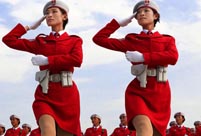 Close-up view of August Aerobatic Team
Close-up view of August Aerobatic Team
 Goddesses married in 2014
Goddesses married in 2014
 Polar region photos raise worldwide awareness of global warming
Polar region photos raise worldwide awareness of global warming
 Get off at the last stop — Beijing Subway in vision
Get off at the last stop — Beijing Subway in vision
 Top 100 beauties in the world!
Top 100 beauties in the world!
 Gallery: Who is the most beautiful one?
Gallery: Who is the most beautiful one?
 If you like autumn, put your hands in the air!
If you like autumn, put your hands in the air!
 Fan Bingbing's "Queen style" in new play
Fan Bingbing's "Queen style" in new play
 Lingerie show at 2014 Miss China
Lingerie show at 2014 Miss China
 J-10 fighters show aerobatic stunts in smog-free sky
J-10 fighters show aerobatic stunts in smog-free sky
SLAUGHTER AND SALVAGE
Today Caoxiexia valley to the northwest of the city is a quiet place. A white monument stands by the road and what was once a reed field is now a water plant.
Zhao Jinhai, guard at the water plant, told Xinhua that people often brought flowers and wreaths for the dead.
Duan Yueping, 82, founder of the Memorial Hall of the Victims of the Nanjing Massacre by Japanese Invaders, spoke of a survivor named Tang Guangpu, who had witnessed the atrocities at Caoxiexia firsthand.
At about 4 a.m. on December 18, 1937, Japanese soldiers began tying up their prisoners, it took them more than 10 hours.
Then they led the bound prisoners to the Yangtze River and executed them with rapid gunfire.
"That day, the river ran red," Duan said.
Tang hid beneath a corpse until the executers left.
But he was lucky, as sometimes, the Japanese not only shot the prisoners, but also bayoneted and threw them on a burning pyre afterward.
A Japanese veteran soilder Riichi Kurihara (direct translation) said in his post-war account that they burned the corpses to destroy evidence of their barbarism.
"Not all the bodies were completely incinerated, leaving a black mountain of charred corpses," he said. "It was time-consuming to throw the corpses into the river and that lasted until noon the second day."
The campaign of murder, rape and looting shocked foreigners in the city, many of whom tried to protect the Chinese people, such as German businessman John Rabe.
His former residence, a two-story black building in downtown Nanjing, concealed and protected more than 600 people.
In the guest book, a visitor from the US, Carol Aschu, said: "We have read Iris Chang's book, 'The Rape of Nanking', and we are glad to find Rabe's house. This is an important story, both of atrocity and of aid, that no one should forget."X Another foreigner Wilhelmina Vautrin, then head of the Education Department of the Jinling Women's Arts and Science College, is remembered by a bust erected several hundred meters away from where the Chinese hid.
"We lived in classrooms, it was so crowded that when you wanted to turn over in the bed, you had to tell the person next to you," recalled Wu Zhengxi, 90.
However, these "safe zones" were not always so.
Wu's brother was taken from the college on the claim that he was a infidel.
"Several days later, I found him by a pool, tied to many others," said the old man, tears in his eyes. "He was a middle school student and I recognized his sports shoes. He was dead."
Wu's aunt, who also took refuge in the college, was snatched by the Japanese one day as she tried to sneak home.
"She committed suicide after being raped. I could not tell our family about this."
 |  |
 20 years on: Relocated Three Gorges residents through lens
20 years on: Relocated Three Gorges residents through lens PLA HK Garrison veterans leave behind beautiful smiles
PLA HK Garrison veterans leave behind beautiful smiles Representative beauties of each province in China
Representative beauties of each province in China Chestnut girl goes viral online
Chestnut girl goes viral online Victoria's Secret Fashion Show
Victoria's Secret Fashion Show In photos: Bright and brave female soldier of PLA
In photos: Bright and brave female soldier of PLA China's charming first lady
China's charming first lady Excellent photos of Zhuhai Air Show
Excellent photos of Zhuhai Air Show China's heavyweight aircraft
China's heavyweight aircraft Society needs consensus on street politics
Society needs consensus on street politics Policy bank plan gets mixed reaction
Policy bank plan gets mixed reaction  Shopaholics
Shopaholics  Hungry moments
Hungry momentsDay|Week|Month